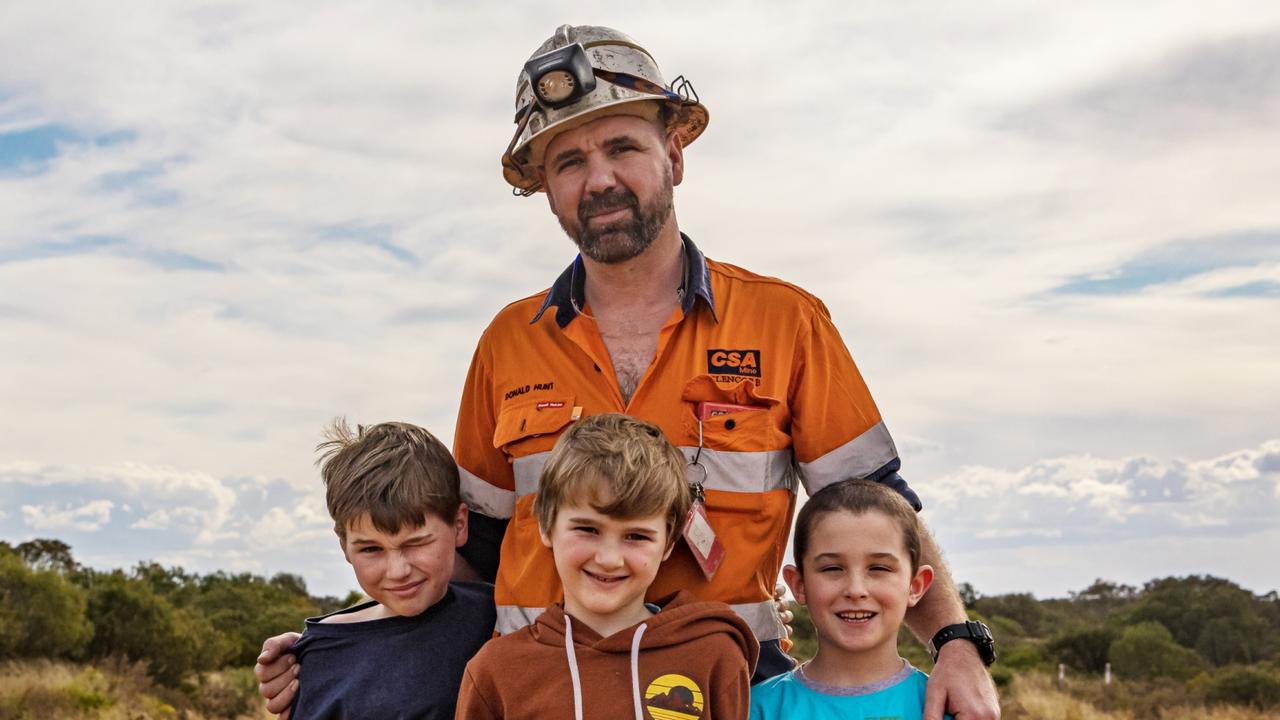Cobar miner Donald Hunt: ‘I do want to see a greener Australia’

Blue-collar mine worker Donald Hunt believes climate change is real and he wants a better future for his kids as we move to a net zero world.
Like many Australians, blue-collar mine worker Donald Hunt believes climate change is real, renewable energy “is the way of the future” and governments need to do more to help make it cheaper and easier to keep our environment healthy for future generations.
The 41-year-old left high school to pack shelves in a supermarket before he started working at a winery near Griffith in the NSW Riverina region.
Mr Hunt said it was his former partner who set the wheels in motion for his move to the iconic western NSW mining town of Cobar, about 300 kilometres northwest of Dubbo.
“I originally came to Cobar through a former partner who was a school counsellor. When I first came to Cobar I worked at the pub, that was my first introduction to miners,” he said.
“A bloke got to know me and he asked if I wanted a job.
“I had no skills at all.”
In 2007 he started working as contractor, sharpening drill bits at the Cobar CSA copper and silver mine owned by international mining giant Glencore.
Mr Hunt said he juggled work and family commitments, working at other mines near Cobar, before he left the industry to work in a battery recycling facility in Wagga Wagga which was closer to where his two sons lived with his ex-wife.
In 2017 Mr Hunt returned to Cobar and he has not looked back despite working almost two kilometres underground seven days a week for 12 hours a day in sometimes scorching heat, before taking seven days off.
“I go to work with a smile on my face.
“I’m actually multiskilled.”
Thanks to career skills, training and development opportunities offered at the CSA mine, Mr Hunt has been able to work innumerous roles. Now he’s one of only a few people in the world who has been trained on how to operate a unique electric powered loader that is set to become an integral part of the mine’s operations.
“I’m probably less than a dozen people in Australia trained to operate it,” he said.
“It’s less noisy and there’s less heat … it’s got a lot of torque. It doesn’t use diesel, it’s all battery powered, I think it’s got about 27,000 lithium batteries in it.
“Australia’s first electric loader is at CSA.”
The mine’s investment mirrors renewable energy investment decisions made by Mr Hunt outside of work, including to put solar panels on his home.
“It’s the way of the future,” he said.
“I would like to see a greener Australia. I’m not a greenie voter but I do want to see pollution cut down in Australia and worldwide. I’d like to see a better future for my kids.
Mr Hunt said he believed the majority of expert scientists who had concluded climate change was real and changes were needed to improve the future health of the environment for his children.
“Even in my lifetime I reckon it’s getting hotter, the sun’s got more of a bite these days than it ever had when I was younger,” he said.
The idea of Australia committing to a goal of achieving a net zero growth in carbon emissions by 2050 is backed by Mr Hunt who said he did not fear the future and thought the outlook was good for copper mines.
Glencore’s corporate affairs manger Francis De Rosa said global demand for copper was expected to double by 2050, nickel demand was forecast to triple and cobalt demand was expected to quadruple.
“An electric vehicle contains more than double the amount of copper than a normal car,” he said.
“As those kind of things increase in demand we see a rise in demand for copper … Glencore has ambitious climate change goals so we’re able to be a net zero total emissions company by 2050.”
Mr De Rosa said while there was still “robust” demand from developing nations for coal, Glencore accepted there would be a reduced need for it in the future.
“We think it’s important to invest in technologies and the battery electric loader is a good one at Cobar because it reduces diesel emissions and the costs associated with underground ventilation,” he said.
“Across the coal side of our business we’re looking at carbon capture and storage technology, and it’s the metal side of the business which will be really important for the world’s transition to a low carbon economy.
“We have agreed to proactively manage the decline of our global coal business over time. It will still have a number of years left, particularly in Australia, but our Columbian coal businesses will come to the end of their lives around about the early 2030s … we still think coal will be part of the energy mix, but it will be a smaller part as other technologies continue to grow.”
For more on this series go to: www.missionzero2050.com.au
Share your feedback or story: [email protected]
Read related topics:Climate ChangeMission Zero


